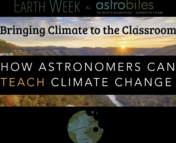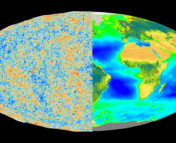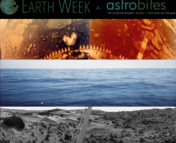This week, we hosted “Earth Week x Astrobites 2022”, with nearly daily events focused on climate change and the responsibility of the astronomy community to mitigate its adverse effects. On 22nd April, we hosted a panel titled “Astro/Physicists in Climate Work: Transferring Astro-skills to Climate Advocacy”. In this bite, we dive back into the panel, giving a brief overview of what was discussed and some key takeaways.
Panelists
Our first panelist was Nora Paul-Shultz (she/her), a physics teacher at the O’Bryant School in Boston. Nora first got interested in climate work at a young age, with her first action being refusing to learn how to drive (much to the chagrin of her parents). While she initially considered pursuing engineering in college, she quickly realized that she wanted to be a teacher and moved into environmental education. She is now a high school physics teacher who focuses on incorporating climate and energy justice into her classrooms.
Our second panelist was David Grinspoon (he/him), an astrobiologist and author at the Planetary Science Institute. As quoted by David, he went into science for “cliché reasons” e.g. being inspired by the Apollo moon landing as a kid. He learned about climate modeling in graduate school and worked on modeling the Earth. He now spends half his time on planetary science research, and the other half on outreach and science communication. He’s very interested in what we can learn about our own climate from that of other planets! You can read more about David and his work in his interview with us earlier this week.
Our third panelist was Kirsten Hall (she/her), a Schmidt Science Fellow at the Harvard & Smithsonian Center for Astrophysics. While Kirsten entered University thinking she would pursue medicine, she left with a Bachelor’s degree in physics and a passion for the Earth and climate science. She pursued graduate studies in astronomy, but at the end of her PhD pivoted into climate science, finding a way to apply the skills she learned in graduate school.
Our fourth panelist was Gabriele Betancourt-Martinez (she/her), a science program officer at the Heising-Simons foundation. Since childhood, Gabriele has loved nature and astronomy! While in graduate school, she had a bit of a career crisis (who doesn’t??), and realized she wanted to get way more involved in climate science. While she continued on after her PhD to do a postdoc in astronomy, she left research afterwards in search of something that focuses on mitigating climate change as well as improving conditions for people from demographics that are under-represented in astronomy.
Our fifth panelist was Colin Hill (he/him), a sustainability insights technical lead at Regrow Ag. Colin did his PhD and postdoctoral studies in astrophysics, but towards the end he felt like he really needed to work on the problems faced by people having to adapt to climate change, or on the solutions for climate change. He entered the private sector, working at a startup company on weather forecasts and land surface modeling for a few years before transitioning to his current job.
Our last panelist was Sydney Chamberlin, currently a project manager at the Nature Conservancy. After pursuing graduate school and a postdoctoral position researching gravitational wave detection, Sydney decided she wanted to focus more on the policy side of climate advocacy. She is most interested in California climate policy, and has previously spent time working with the California Senate Committee on Natural Resources and Water as a California Council on Science and Technology (CCST) fellow.
How can you, as an astro/physics student or researcher, get involved in climate change work?
All the panelists agreed that there are numerous ways for astro/physics students to get involved in climate related work. The skills and training we obtain as astro/physics students are applicable to addressing a variety of problems in climate change mitigation. What one really needs to succeed is interest and drive! On the individual side of things, we can start by making small changes in our daily life, e.g., understanding the effect of our lifestyle on climate change and making modifications, learning about our local government’s policies on climate change mitigation and voting accordingly, etc.
If you are interested in a teaching career, then classrooms are a great place to bring in the conversation about climate change! Young people really want to get engaged and learn about the causes and effects of climate change, as well as what they can do to help. There are teaching fellowships one can apply for, such as the Robert Noyce Teacher Scholarship Program, which pays you to become a STEM teacher!
The most common advice from all the panelists was to talk to people about climate change! People aren’t always receptive to climate conversations, but astronomy is a great gateway into the conversation about our place in the universe and the fragility of life on our ‘pale blue dot’, and can naturally lead into a conversation about Earth and climate change.
What are some resources and advice for current physics and astro students interested in climate work?
Multiple panelists mentioned the incredible Ayana Elizabeth Johsnon and her venn diagram to figure out what your role could be in tackling the climate crisis. The venn diagram asks you to find the intersection between ‘What are you good at?’, ‘What is the work that needs doing?’ and ‘What brings you joy and satisfaction?’. We should not underestimate the power of what gets us excited! The intersection of what we enjoy doing and what needs to be done is what will make the biggest impact.
Making connections and expanding our network with people who do the kind of work we are interested in doing is another crucial step. Some groups to find like-minded individuals and jobs related to climate change related issues are A4E (astronomers for planet earth), Climate Base and Work on Climate. There are numerous opportunities within industry and NGOs to work on climate change related issues, and one can find a niche that fits one’s skillset – be it programming, data science or policy analysis. While it’s true that work in industry is often driven by business incentives, there is work that lies in the sweet spot of climate change solutions and being good for business. For example, in the field of regenerative agriculture, the direct problem of agriculture related emissions is addressed at the source. But since the overall project is driven by business incentives, the adoption is rapid and the impact can be at a massive scale.
Finally, a general piece of advice, regardless of the profession you are in, is to work on your communication skills! Even as scientists not directly working in the field of climate science, we have a certain understanding of the basic physics of anthropogenic climate change and the abundance of evidence for it, and hence we should learn how to be comfortable communicating this.
How can we deal with eco-anxiety?
The panelists acknowledged that exo-anxiety is hard to avoid. One panelist shared that they alternate between days when they feel like their work is making an impact in the fight against climate change, and days when they are completely overwhelmed. Talking to our community, staying connected with the people around us and practicing mindfulness can help with our mental well-being. Doing climate work with others can also help alleviate the feeling of being overwhelmed and help us realize that we are not alone. There are currently therapists who are trained in helping people deal with eco-anxiety, and resources that can help you get connected! There are also training programs such as resilience training which can help you deal with the stress of uncertainty.
‘Doomism’ (the idea that it’s already too late) is also something people struggle with with regards to climate change, and can be really disempowering. We should keep in mind that there is a lot of uncertainty in our future scenarios! No one can predict the future exactly and it all depends on what humans collectively end up doing to mitigate the effects of climate change. So, let’s keep in mind that we don’t have to accept that the future will necessarily be awful and hopeless, while still maintaining the sense of urgency that will drive us to addressing the climate crisis.
And some more questions that were discussed in the Q&A…. (questions and answers below have been paraphrased and/or shortened)
Q: How do we reconcile doing interesting science with its climate impacts? (Based off of a recent Nature Astronomy paper that estimated sky high carbon footprints for different astronomical research facilities)
A: It’s a fantastic first step to identify the areas that need the most work to reduce emissions. Then, we can actually make changes to address them, as we’ve seen some of the astro community doing e.g. less travel to meetings/observing sites. An important fact to keep in mind though is that 100 companies are responsible for ~70% of global emission, so we can also target our efforts on making local and global policy change. So while individual action is important, community action is even more so. As we continue to make targeted efforts on all fronts, hopefully we will cause a ripple effect!
Q: Could you speak a bit more on the interplay between energy and equity? I imagine these are inherently very societal issues. So what are some things we can all be cognizant of in our day-to-day lives?
A: I think there are a number of different levels that you can talk about energy and equity. I have learned a lot of this from the folks at the Energy and Equity Project. There are levels of interplay about who is in the classroom and who is represented when you talk about who is a physicist/astronomer. There are also deeper levels of interplay when discussing what counts as science and how are using/not using physics knowledge for justice issues. We often don’t talk about energy generation in intro to physics classes, and instead only focus on less complicated (both physics wise and societal wise) problems.
Q: Does anyone have advice for how we can discuss really important (real possibility of nuclear war & rapid climate change) issues with the general public that need to be addressed ASAP?.
A: Arguably, people are starting to understand (see this Nature article on the rate of climate beliefs), but certainly not fast enough.
Written by Alice P. Curtin and Ishan Mishra
Edited by Pratik Gandhi
This article was written as a part of our Climate Change Series. We’d love to hear what you would like to see from this initiative – if you have ideas, please let us know in this google form.




